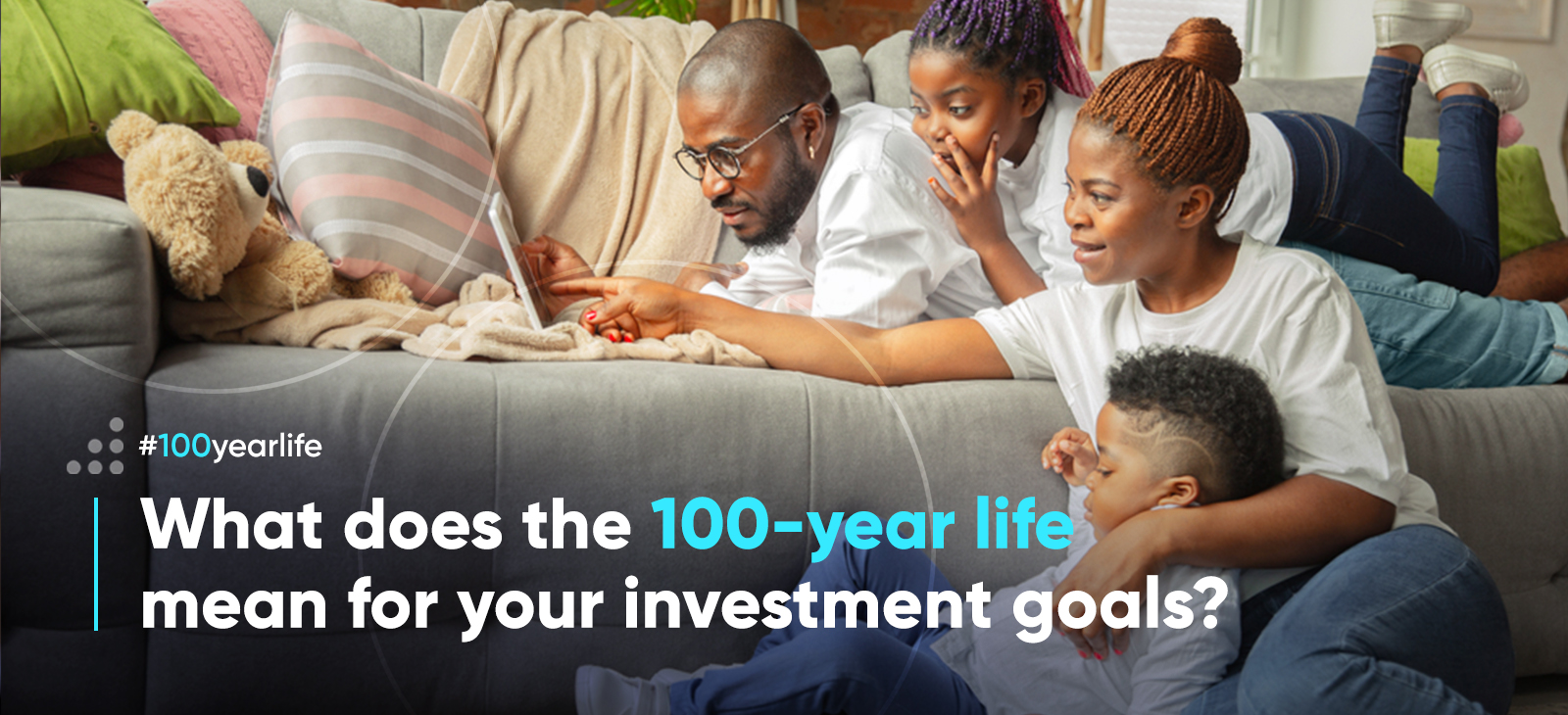
What does the 100-year life mean for your investment goals?
Learn more on what’s holding you back from achieving financial independence and freedom.
Wealth Migrate aims to help investors realise their dreams of achieving financial independence. What it takes to achieve financial freedom is subjective to each person, but in this article, we analyse if there’s a difference between financial independence and financial freedom. We also look deeper into why people are not reaching their financial goals and what is holding everyone back from achieving them, especially with the reality of the 100-year life looming ahead.
For a broader picture on what the 100-year life entails, Wealth Migrate’s Chief Marketing Officer, Mariken Jansen van Vuuren, has some thoughts on the future of finance and how we are managing our wealth creation and protection. Read this article on her outlook on planning for retirement and the reasons for everyone to act sooner.
Financial concerns for the 100-year life
Most people feel like financial prisoners even though they have tried to save for the future and their income does not match their expenses.1 Similar to losing weight it is easy to tell people to make sure their expenses are lower than their income, however, all too often this takes conscious effort and self-discipline to start healthy financial habits and patterns that will pay off in the long run.2
If it seems that for most people becoming financially free is out of reach despite working long hours for a salary that does not seem to support the lifestyle they wish to maintain. Perhaps, the issue is not the salary or working harder for even more years (assuming one retires closer to ages 70-80 in a 100-year life), but rather of taking control of the cashflow.
These are the problems we have observed due to the new economy and the 100-year life:
- Financial behaviour – how we think and talk or don’t talk about money.3
Most people have been raised not to talk about money. It is an uncomfortable topic, purely as we have never been allowed to either raise it or properly discuss it in-depth. Therefore, it is not surprising that even when we reach out for help with our finances, we find it difficult to talk about. Think about this scenario, have you ever asked your parents what they earned salary-wise? Most of us have been told it is not polite to ask or have even been silenced after asking this question.
Another part to this taboo of talking about money is that it makes people emotional. Outside of the shelter of school and/or living at home with our parents, we are forced to confront how we truly feel about money. Money often holds a place in the dreams of the future, along with the other concerns of not having enough money, and not doing enough with it. This makes it a very emotional subject.
- Retirement funds and saving policies.4
Although people are still using retirement funds and savings policies, an unfortunate side effect of the COVID-19 pandemic, was the severe global lockdowns affected earning capacities. When it comes to hard times, people are more likely to surrender a retirement fund. BusinessTech states, “a surrender occurs when the policyholder stops paying premiums and withdraws the fund value before maturity.”5
This is a problem as not only is the person losing out on future savings, but the surrender also has certain penalties for early withdrawal. Most savings policies are structured for a short- or long- term plan, and long-term saving policies often contain similar penalties for early withdrawals or penalties for not giving sufficient notice to withdraw the available funds.
Individuals are becoming increasingly more aware of their personal finances and with pressures from pensions and social welfare systems becoming more restrained, the knock-on effect is that people and not companies, are being held to save for the future.6 Employer sponsored plans are giving way to private contribution plans with the onus on the employee to make sure that this is covered.
- New investment currencies and assets.
The range of financial options has changed with the rise in tech creating innovative products, and some are more complex. People lack the knowledge and awareness of these new investments, plus, the confidence to invest.
- The social media generation and the way they think about money.7
The difference in generational thinking has never been so apparent as with the social media generation. Older generations will turn to a financial consultant or advisor, whereas the younger generation turns to social media for validation on their decisions, including financial ones.
There is a reason for this behaviour, Generation Z was around when their elders went through the 2008 financial crash in the markets. Along with an increased anxiety on financial worries, inflation, high rental and home ownership prices – Gen Z was also born during the golden age of tech.
The rise of social media in the 2000s, means that this generation grew up with social media having a large presence in their lives. Think of YouTube and Facebook, and the rise of newer platforms such as Instagram and TikTok. That’s why it’s natural that Gen Z is almost five times more likely to seek financial advice on social media than adults aged 41 and over.
- Lack of knowledge or deep understanding of the available investment options.8
The financial industry boomed in the golden age of tech, and the results are an array of financial products that have caused disruption with how people earn and spend money. Even the way people pay for products and services has transformed, and this has given rise to people having to be more knowledgeable and invested in their financial welfare.
- A belief that a person has no access to legitimate potential investments.9
The gap between being financially literate or illiterate is large. A third of the world’s population is not familiar with basic financial decisions and this statistic is higher when it comes down to gender. Females are more likely to cite a lack of confidence in making financially literate decisions, and this affects what they believe about money, and how they approach their decision-making.
Manage money responsibly
The secret is that whether you start off in the lower-, middle- or upper- class wealth bracket, everyone should have access to the tools to create and protect wealth. Managing money responsibly requires the skills of financial literacy, a skill that is often not taught enough at school or further education institutions. We have access to more information than ever, so why have our habits and thinking around wealth creation and protection not changed that much in the last 11 years?
The answer is although humans have changed how we spend and save our money, our thinking has not. In 2011, US News noted this was a simple concept that has become more complicated with mass consumerism in the mix. “You spent what you needed and saved the rest. But as mass consumption has become a dominant force in the US economy, the tension between spending and saving has become far more acute”.10
Worldwide, everyone is facing these same issues as with current market pressures and rising inflation rates, peoples’ earnings are being hard-pressed to catch up. This leads to saving less and spending more, but spending in this situation means relying on credit. Funding purchases that cannot be paid back immediately, causes a cycle of accumulating debt (as this accrues interest along with the original amount charged), and this all adds up.
Once one reaches the age of adulthood, it is automatically expected that one understands how to make money while working, and more importantly how to make that money work for that person. Of course, this is not true. According to The S&P Global FinLit Survey, the discrepancy on financial literacy is staggering. Its 2015 findings published that just 33% of adults worldwide are financially literate, this accounts for a total of 3.5 billion adults.11
It’s a gamechanger, if people are lucky to have parents, mentors, friends, and financial advisors that can steer them in the right direction and promote healthy money habits. People who are financially literate can make informed financial choices regarding saving, investing, borrowing, and more. But most often than not, money is a taboo subject, even in families or close-knit groups of friends.
What do people do if they do not have access to such experience and knowledge? The answer is to upskill and network to find like-minded peers. In the scenario of a 100-year life, this should give one more time to finesse these skills and networks. Just in the same way that you learn important skills through education, learning how to control money is going to make the difference in achieving financial independence and ultimately, financial freedom – where being able to live a life unlimited is a reality and not a mere possibility.
Avoid falling victim to an investment scam
Unfortunately, there are a lot of scams that claim to provide instant get-rich schemes or offer exceptionally high returns with no proof to back this up. Some people feel desperate enough to buy into these schemes, as these scammers trigger a fearful response.
Always perform your own due diligence and ask these important questions before you invest any money. With the advances in tech, scammers are becoming smarter on how to pull off their scams and potential investors can take these steps to verify whether the investment is legitimate or not.
10 questions you should ask yourself, if you think the investment could be a scam:12
- Have you performed a thorough internet search on the company and checked whether they are on any platforms such as Trust Pilot or Hellopeter? Customer review platforms will be able to provide evidence that the business is legitimate.
- Is the promise of a return too good to be true? No investment is without risk and if it promises to guarantee to double or triple your return in a very short period, this should set off alarm bells in your mind.
- Does the business offering the investment have a valid licence? It should be licenced with the Financial Services Conduct Authority (FSCA) and proof in the form of an FSP number should be visible on the company’s marketing. For further certainty, call the FSCA and verify that the licence and organisation is valid.
- Does the business have a bank account in a private name? No reputable organisation would have a private account, it should be a business account with a well-known financial institution.
- Have you been asked to provide private information over a telephone call, e-mail or text message? You should be careful when handing over your personal information.
- Does the advertisement of the investment use spam trigger words? There are lists of spam words that potential investors can check.
- Have you been asked to pay upfront fees and is this fee structure transparent? Legitimate businesses will not require upfront fees and will be able to provide a clear fee structure for their investments.
- Do you need to personally recruit more investors before you can access the investment deal? This is a common tactic for multi-level marketing or a Ponzi scheme.
- Are you being given a free giveaway? Scammers lure potential investors with the promise of free giveaways, a legitimate financial service provider does not drum up business this way.
- Do you need to invest at this very minute, or you’ll lose out? For time-sensitive investments, the scammers want to get easy money and quickly. A common method is to put immense pressure on the potential investor to invest at that moment or they will lose out. An authentic business will not take this approach and will be able to provide information on their business performance and track record.
The difference between financial independence and financial freedom
The definition of financial freedom is different for every person. One thing that authors, coaches and philanthropists, such as Tony Robbins agree with; this is a mindset. Most people do not realise they already have the tools to create and protect wealth but being wealthy means more than just having an excess of money.13 In fact, where living longer is now more probable humans will want to leave a legacy and add meaning to their longer lives, and money alone does not encompass this.
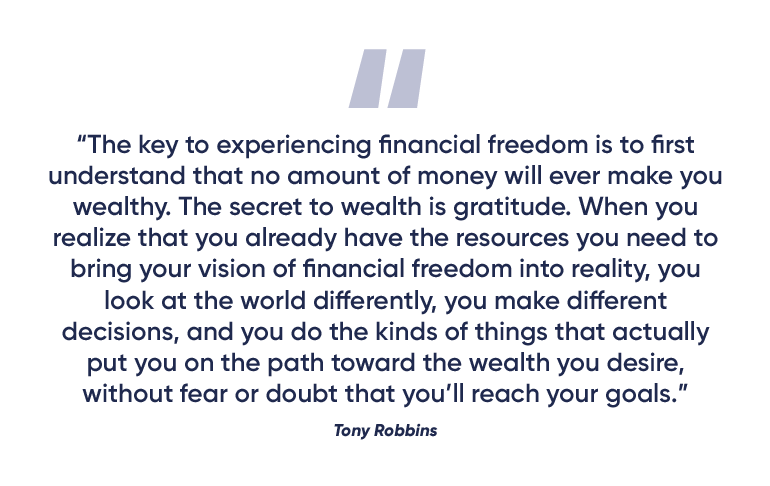
Financial freedom as a concept
Financial freedom means embracing a long-term life purpose that has been dreamed about, whether it is working less, donating more time and money towards projects that bring about fulfilment and happiness, or even supporting charity work.
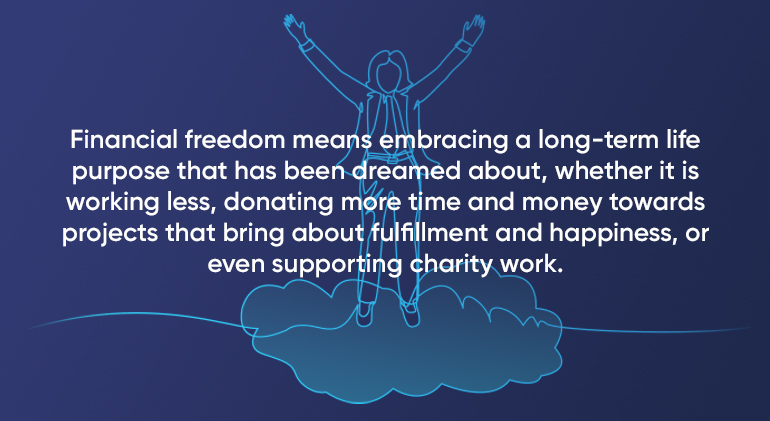
Financial independence and its meaning
Financial independence on the other hand may appeal to pragmatists that want a concrete number that means one is officially not reliant on working a nine-to-five job. After examining one’s financial situation in depth, and assessing debts, income, liabilities and assets – there should be a definitive number that allows one to be financially independent.
The Wall Street Journal has also written about this lure of retiring early by following the FIRE method. This is a popular philosophy whereby people live below their means, save more, and be less materialistic.14 The reality is one certain way to ensure your income will be enough for retirement and beyond, is to increase it.
While the FIRE method does promote good money habits, it fails to consider that the pioneers of this method have more than one income stream available.15 If one quits that nine-to-five job, there’s still more income being earned than being spent.
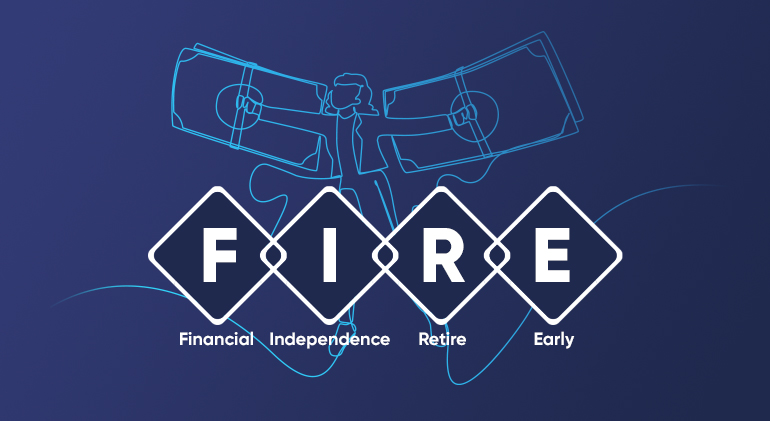
The best way to increase income is to invest money, and while that may still be a worry for some investors, experience shows that the value of money in the present will be less in the future.16 Money needs to be maximised not simply earned, and investing is a good solution to ensuring that the wealth one has worked hard to earn and save, does not decrease in value over time.
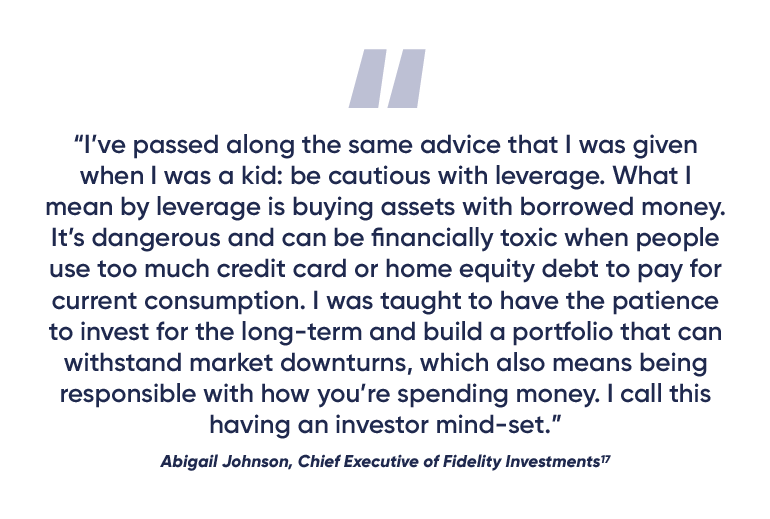
For the 100-year life, investors need to accept continuous learning as an essential pre-requisite.17 A 100-year life means having a new mindset for achieving financial freedom, which works together with financial independence. Failure to achieve financial goals should not be seen as a stumbling block, rather learn from that experience as failure is the route to success.
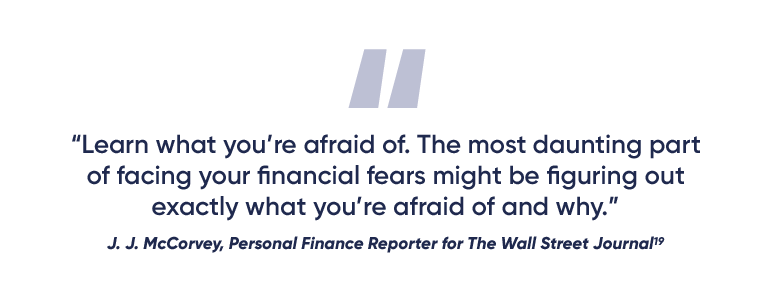
The path to success is to remain open to opportunities and make the most of them. Investors should also have a solid foundation for an investment portfolio, a globally diversified portfolio will ensure that during market volatility there is less chance of losing the entirety of the invested assets.18 In fact, investors will be better off by investing in a mix of traditional and alternative assets, especially where higher returns and lower investment fees can provide a welcome boost as additional income.
As part of an ongoing educational series, our next article will examine the realities of the 100-year life, and how investors should go about wealth creation and protection with this increased longevity in mind.
Find more Wealth Migrate content:
Read our investment articles and listen to the podcasts. We cover the topics of diversification, structured notes, purpose-built-co-living, and industrial real estate.
1 Mathis, T. (July 2022). ‘Understanding the true burden of debt to your financial freedom’. Retrieved from Forbes.
2 Rae, D. (April 2019). ‘8 Levels of financial freedom’. Retrieved from Forbes.
3 Richards, C. (2022). ‘How to talk about money’. Retrieved from The New York Times.
4 Staff Writer. (September 2021). ‘More South Africans are cashing in their retirement plans’. Retrieved from BusinessTech.
5 Staff Writer. (September 2021). ‘More South Africans are cashing in their retirement plans’. Retrieved from BusinessTech.
6 Lusardi, A. (2019). ‘Financial literacy and the need for financial education: evidence and implications’. Retrieved from SpringerOpen.
7 Tkachenko, T. (August 2022). ‘This is where Gen Z goes for financial advice’. Retrieved from The World Economic Forum.
8 Lusardi, A. (2019). ‘Financial literacy and the need for financial education: evidence and implications’. Retrieved from SpringerOpen.
9 Lusardi, A. (2019). ‘Financial literacy and the need for financial education: evidence and implications’. Retrieved from SpringerOpen.
10 Newman, R. (December 2011). ‘How spending and saving are changing’. Retrieved from US News.
11 Klapper, L., Lusardi, A., and van Oudheusden, P. (2015). ‘Financial Literacy Around the World’. Retrieved from The Standard & Poor’s Ratings Services Global Financial Literacy Survey.
12 Torr, C. (June 2020). ‘How to spot an investment scam’. Retrieved from Moneyweb.
13 Robins, T. (2007). ‘Financial freedom: 3 steps to creating and enjoying the wealth you deserve’. Retrieved from Tony Robbins Personal Coaching Collection.
14 Papadopoulos, G. (January 2019). ‘Financial Independence, retire early? Not so fast’. Retrieved from The Wall Street Journal.
15 Chopra, P. (August 2022). ‘Beginners guide to financial freedom: 4 basic steps to start your investment journey’. Retrieved from The Economic Times.
16 Gratton, L., and Scott, A. (2018). ’The 100-year life. Living and working in an age of longevity’. Retrieved from The 100-year life.
17 Wall Street Journal Staff. (September 2019). ‘Just starting out? Here’s money advice from the pros’. Retrieved from The Wall Street Journal.
18 Wealth Migrate Staff Writer. (2022). ’The role of diversification in uncertain times’. Retrieved from Wealth Migrate.